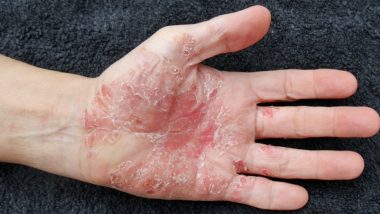Psoriasis is a skin condition characterised by flaking, inflammation and embossed patches that are red, white or silvery in colour. It’s a chronic, non-contagious condition caused by an overactive immune system. Although it’s a skin condition, the effects of the condition are beyond skin deep. World Psoriasis Day is observed every year on October 29 to focus attention towards his incurable skin disease and the ways to manage them.
What is Psoriasis?
Psoriasis is characterised by dry, scaly skin, caused by the rapid increase in the number of skin cells, which is triggered by the immune system. The condition accelerates the person’s skin replacement process. In a normal person, the process takes 21-28 days. But with psoriasis, the process shortens to 2-3 days. Skin in areas such as elbows, knees and scalp is the worst affected after the skin starts accumulating to form plaques. In some cases, psoriasis can also affect the joints.
What Are The Causes of Psoriasis?
According to recent research, the condition occurs when certain immune cells get triggered and become overactive.
It’s as if the T cells are fighting an infection or healing a wound. This causes him to produce inflammatory chemicals, leading to increased skin-cell growth and causing psoriatic plaques. The Healing Caves of Gastein in Austria has Natural Radioactive Treatment Curing You Of Joint Pain.
Some people who have the condition have a family history of it. The disease may be triggered by a number of factors such as stress, anxiety, skin injury, hormonal changes, medication or infections. Have Arthritis? Here’s What an Expert Wants You to Do.
What Are The Symptoms of Psoriasis?
Plaque psoriasis of the skin show symptoms such as chronic itching, bleeding, scaling, etc. Inflamed, red rashes, and flaky patches may appear on the skin and scalp.
Fingernails and toenails may get discoloured or pitted. The nails may also detach from the nail bed and fall off.
How to Treat Psoriasis
Psoriasis is an incurable disease; there is no way to eradicate it completely. But there is a wide variety of treatment for the problem. But finding the right one for the person can be a matter of trial and error.
Topical treatment such as salicylic acid, lactic acid, urea and phenol are used to treat psoriasis. Hydrocortisone, camphor, hydrochloride and menthol are some of the other topical medications.
Systemic therapies like acitretin, cyclosporine and methotrexate are also used to treat psoriasis.
Phototherapy or light therapy where patients expose their skin to ultraviolet light is also done these days under medical supervision.
Psoriasis also co-exists with certain other co-morbid conditions such as obesity, alcoholism, chronic inflammation, high cholesterol and stress. Studies find a twofold or threefold increase in mortality from cardiovascular diseases in such people. Malignancies or cancers, especially lymphoma and non-melanoma skin diseases are also common in psoriatic patients.
Perhaps the biggest casualty of psoriasis is its psycho-social effects. There's a considerable decline in the patient's quality of life due to the highly-visible symptoms of psoriasis. The disfiguring disease can also take a toll on personal and social lives. About one in four patients experience psychological distress, social stigmatisation and ostracisation.
(The above story first appeared on LatestLY on Oct 29, 2018 06:39 PM IST. For more news and updates on politics, world, sports, entertainment and lifestyle, log on to our website latestly.com).













 Quickly
Quickly


